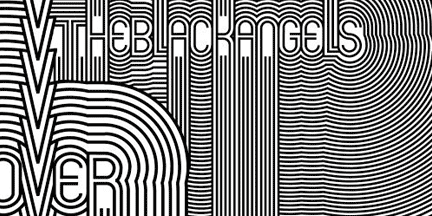
“The First Vietnamese War”
from the album Passover
2006
iTunes
Download an MP3 of “The First Vietnamese War” from Light in the Attic Records
[right-click/save-as]
I catch my reflection in the car windows lining the street. A flash passes through the tinted glass as I walk by. I stop. My cigarette bounces off the curb into the sewer and the bar’s windows are shaking with the reverb. The bar is loud, but the haze of lights and smoke soothes the shock of sound. The Black Angels hover on the stage in a fit of psychedelic dirge. It’s beautiful and scary. The bar is loud and it’s getting darker.
The Black Angels make things seem cooler than they are. Rap videos have slow motion, bad dancers have strobe lights, and now timid rock rebels everywhere have the Black Angels. From their name right down to their quoting of Edvard Munch on their debut album Passover, this Austin, Texas seven-piece has a serious penchant for drawing out the entrancing elements of the darker stuff. It’s all gloom and doom, but it slinks along so sexy that it seems more vital than grave.
Shading their stomping groove with echo and drone, this band is something wonderful: spellbinding. They’ve returned after their winter-released debut EP with this impressive 10-song collection (including three passed over from that release), proving they’re no fluke. Seeming like something from a scene in Apocalyspe Now — if Scorsese had directed it — Passover comes off like an aural manifestation of a journey into darkness.
A band that doesn’t seem inclined to explore any uncharted territory in the world of rock, it’s at least refreshing that they communicate such a sense of danger. And that’s something sorely missing from the often-safe sounding ’00s rock n’ rollers. Like their noisy press release exclaims, “These are fighting times people.” And sometimes you got to wonder why rock bands don’t have more fight to them these days. Green Day starts dressing in black and wearing eyeliner and suddenly they’re the lead voice of defiance amongst America’s rock musicians? Please; there’s more urgency in the hearts and fists of guitar-toting kids than that.
The Black Angels don’t instill much substance in the rebellion, but at least they get the style right. It’s bleak and it’s easy to get lost in it, but there’s a fire in the middle of it that keeps burning as long as it pounds in your chest and out your fist. Check out the song titles — “Call to Arms,” “Young Men Dead,” “Manipulation,” “Empire” — something tells me this band didn’t cast any votes for the current U.S. administration. But despite the anti-authoritarian bent of Passover, the album doesn’t mire in the boring or preachy. Their protest stance is no pose so it doesn’t end up grating.
The Black Angels pull off this nouveau ’60s style rebel yell thanks to a simple cinematic aesthetic (it’s crude, it’s so basic). It’s all subterranean tunnels with dangling light bulbs clicking on in sparks. They hold on to that kind of dark mood with death grips—never relaxing their distorted guitars, drone machines and echo boxes. It’s dark and dangerous sounding, and it hardly seems cliché, thanks to a politicized convictions and a delivery as suave as it is strong. Which is to say, they’re a kicking rock band: hotheaded, loud and cool.


